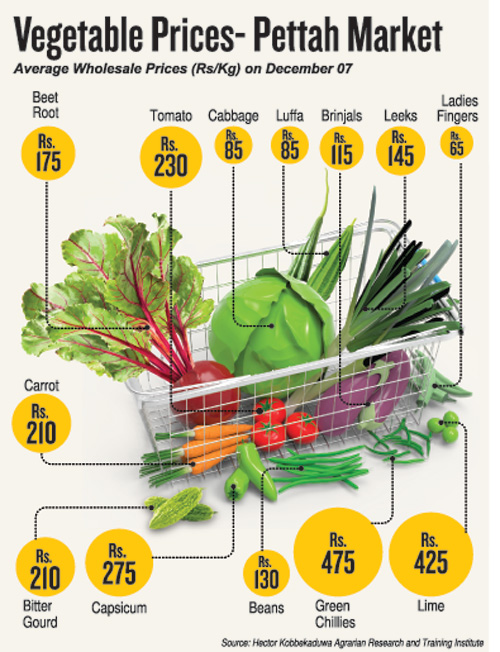News
Seesawing veg prices a headache for all
Vegetables have become 75 per cent more expensive in the peak season than in the off-season and somehow this gap must be bridged, a top research group said.
The gap between peak and off-peak prices has been exacerbated by heavy showers in the past weeks, the Hector Kobbekaduwa Agrarian Research and Training Institute (HARTI) said.
“There is a 40-50 per cent reduction in the supply of vegetables to the market these days, hence prices have shot up,” the institute’s Senior Research Officer, W.H.D. Priyadarshana, said.
He emphasised that inadequate storage and transportation facilities aggravated supply shortages.
Mr. Priyadarshana said November, December and January mark a transitional period between the end of the Yala season harvesting and the beginning of the Maha season and “generally during this time the supply of vegetables decreases as these months are used for land preparation for the next season”.
Such fluctuations should be minimised by long-term solutions such as building cool rooms and processing centres, Mr. Priyadarshana said.
Addressing the infamous issue of middlemen he said it was important the market had them to bridge the gap between the farmer and the buyer but too many middlemen were harmful to the market.
Consumer advocates said forcefully that middlemen created huge losses to both farmers and consumers.
“The middleman is the reason for the current malfunctioning of the market, plundering both the farmer and the consumer,” the head of the National Movement for Consumer Rights Protection, Ranjith Vithanage, said. They should be controlled by a regulatory body, he said.
He warned that with vegetables now selling for more than Rs. 400 a kilo the country faced a situation where staple food would not contain vegetables because of their cost.
The All-island Farmers’ Federation agreed with HARTI’s call for long-term vegetable storage to minimise waste.
“Every day, 40 per cent of the harvested vegetables are thrown out due to the lack of proper storage facilities,” the federation’s National Organiser, Namal Karunaratne said.
Mr. Karunaratne said farmers were leaving the land because they could not cope with fluctuating prices for their produce.
He said farmers should be trained to cater to market needs and plan their cultivation to reduce wastage.
The Agriculture Ministry rejected claims that middlemen caused significant changes in vegetable prices, saying the rains were to blame.
“The country initially experienced drought, as a result of which farmers did not cultivate, and when a considerable amount of rains were received they started cultivating only to find, to their dismay, that weather conditions worsened and a lot of crops, especially vegetables, were destroyed,” ministry Media Director W.M.D.Wanninayake said.
He said prices would increase as Christmas and New Year drew closer and then drop in January.

